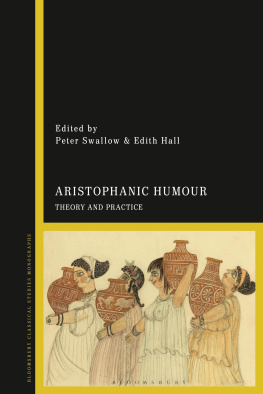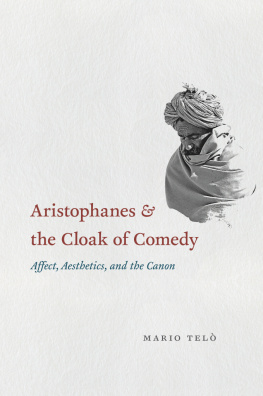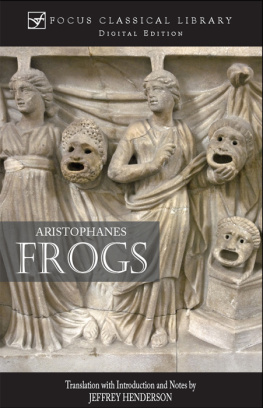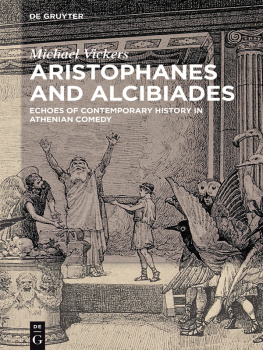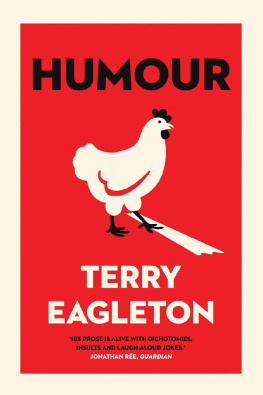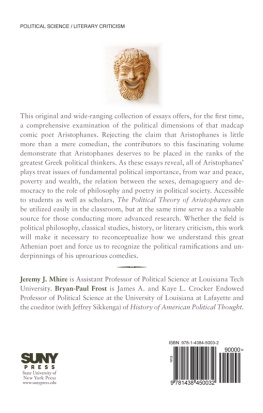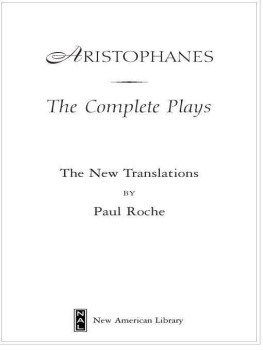
ARISTOPHANIC HUMOUR
Also available from Bloomsbury
ARISTOPHANES AND THE DEFINITION OF COMEDY
by M. S. Silk
COMEDY
by N. J. Lowe
GREEK LAUGHTER
by Stephen Halliwell
HUMOUR, OBSCENITY AND ARISTOPHANES
by James Robson

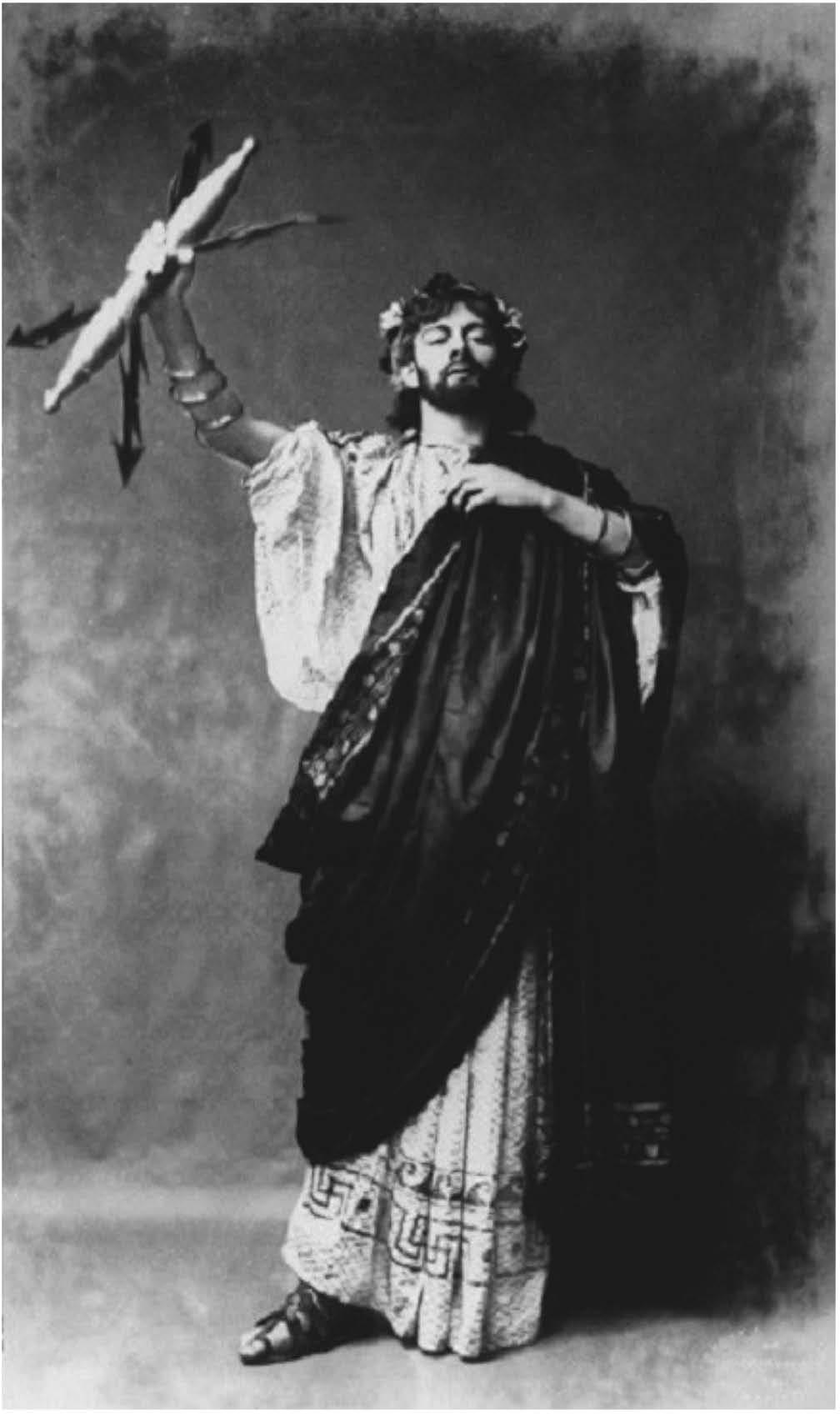
For Ellie and Jess,
Sarah and Georgie
CONTENTS
David Bullen is a writer, director, dramaturg and academic specializing in adapting the plays and myths of the ancient world to the modern stage. A co-founder of By Jove, a London-based socialist feminist theatre company that works with myth, he is currently one of its co-artistic directors. He has written adaptations of plays by Aeschylus, Sophocles, Euripides and Aristophanes, with productions in both the UK and the United States, and has taught at Royal Holloway, University of London, and Rose Bruford College of Theatre and Performance.
Pierre Destre is Associate Research Professor at the Fonds de la Recherche Scientifique and teaches ancient philosophy at the University of Louvain, Belgium. He is the author of numerous articles on Plato and Aristotle, and has a special interest in the uses of humour in ancient philosophy. He has edited many volumes, most recently (with Franco Trivigno) Laughter, Humor, and Comedy in Ancient Philosophy (2019).
Maria Gerolemou is a Leventis Research Associate in Hellenic Studies at the University of Exeter, UK. She is the author of Bad Women, Mad Women: Gender und Wahnsinn in der Griechischen Tragdie (2011), and the editor of Recognizing Miracles in Antiquity and Beyond (2018) and Mirrors and Mirroring: From Antiquity to the Early Modern Period (with Lilia Diamantopoulou, 2020). She is now working on a monograph on automation in classical antiquity.
Edith Hall is Professor of Classics at Kings College London, UK, and Consultant Director of the Archive of Performances of Greek and Roman Drama in Oxford, UK. Her books on ancient Greek culture and its reception include The Return of Ulysses (2008), Greek Tragedy (2010), Adventures with Iphigenia in Tauris (2013) and Introducing the Ancient Greeks (2015).
Craig Jendza is an assistant professor of Classics at the University of Kansas, USA. His research interests include Greek tragedy, comedy, satyr drama, mythology, magic, linguistics, humour and horror. His monograph Paracomedy: Appropriations of Comedy in Greek Tragedy examines how Greek tragedians regularly appropriate elements from comedy such as costumes, scenes, language, characters or plots. Some of his recent articles have investigated paracomedy in Euripides Orestes (American Journal of Philology), persuasive analogies in Greek magic (Archiv fr Religionsgeschichte) and Indo-European mythology in Bacchylides (Journal of Indo-European Studies).
Dimitrios Kanellakis is a Research Associate at the University of Oxford, UK, where he recently completed his doctorate. His research interests revolve around Greek drama, lyric poetry, theory of literature and classical reception. He is the author of Aristophanes and the Poetics of Surprise (2020) and editor of Ancient Greek Comedy: Genre, Texts, Reception (with Almut Fries, 2020) and of a forthcoming volume on The Pathology of Love in Greek and Latin Literature.
Adam Lecznar is Lecturer in Classical Languages and Literature at the University of Leeds. He has research interests across classical reception, intellectual history, and ancient and modern literature. His publications include essays on Nietzsche, Joyce, Aim Csaires tragedies and Alejo Carpentier, and he has completed a monograph called Dionysus after Nietzsche: The Birth of Tragedy in Twentieth-Century Literature and Thought.
N. J. Lowe is Reader in Classical Literature at Royal Holloway, University of London, UK. His books include The Classical Plot and the Invention of Western Narrative (2000) and Comedy (2008); a book on the classical roots of science fiction is forthcoming from Liverpool University Press, and he is currently finishing a study of ancient Greece in historical fiction.
Athina Papachrysostomou is Assistant Professor of Ancient Greek Literature in the Department of Philology, University of Patras, Greece, and a Fulbright alumna. Her research interests include Greek comedy, Athenian political history and textual criticism. Apart from several articles and volume contributions, she has published four monographs (two in English: Six Comic Poets: A Commentary on Selected Fragments of Middle Comedy, 2008, and Amphis: Introduction, Translation, Commentary, 2016; and two in Greek: one on Athenian Democracy in 2014, and one on textual criticism in 2017), and has co-edited one collected volume (Time and Space in Ancient Myth, Religion and Culture, 2017).
Ralph M. Rosen is Vartan Gregorian Professor of the Humanities in the Department of Classical Studies at the University of Pennsylvania, USA. He has published broadly in various areas of Greek and Roman literature, with special interests in comic and satirical literary genres, ancient aesthetics, ancient philosophy and medicine, especially Galen. He is co-founder of the Penn-Leiden Colloquia on Ancient Values, and co-editor of six published volumes (Brill) emerging from these occasions. His most recent book is Making Mockery: The Poetics of Ancient Satire (2007). He is currently involved in various research projects on Greek comedy, Hippocrates and Galen.
Pavlos Sfyroeras is Professor of Classics at Middlebury College, Vermont, USA. He has published a number of articles on several Greek poets, including Aristophanes, Euripides, Sophocles and Pindar. His forthcoming book The Feast of Poetry: Sacrifice and Performance in Aristophanic Comedy (Center for Hellenic Studies) combines his interests in poetic genres, both dramatic and non-dramatic, and ritual performance. His concern with situating poetry in its historical context informs another book-length project that is tentatively entitled Pindar and Athens: Epichoric Traditions of Mythmaking.
Peter Swallow completed his doctorate at Kings College London, UK, researching the Victorian reception of Old Comedy, and teaches at KCL and Goldsmiths, University of London. His publications include studies on the translation and performance of Aristophanes.
Mario Tel is Professor of Classics at University of California, Berkeley, USA. He is the author of Aristophanes and the Cloak of Comedy: Affect, Aesthetics, and the Canon (2016). In 2018, he co-edited, with Melissa Mueller, The Materialities of Greek Tragedy (Bloomsbury). His new book Archive Feelings: A Theory of Greek Tragedy is forthcoming in 2020 in the series Classical Memories/Modern Identities.
Natalia Tsoumpra is a lecturer in Classics at Glasgow University, UK. She specializes in Greek comedy and tragedy, and is also broadly interested in ancient medicine, magic, gender and sexuality, and theories of humour. She is the co-editor of Morbid Laughter (Illinois Classical Studies 43.2) and the editor of
Next page
